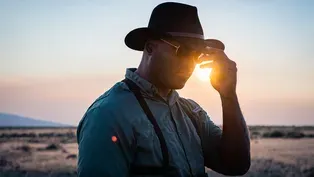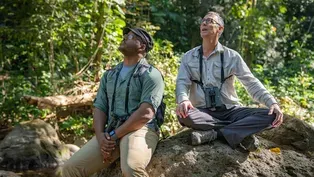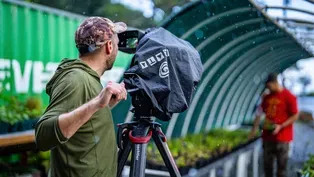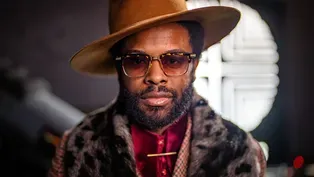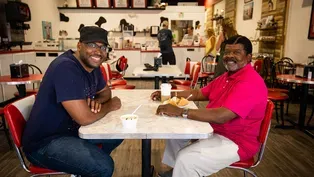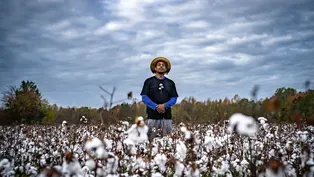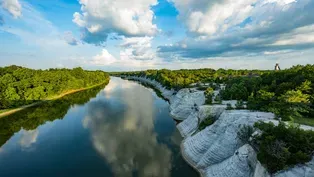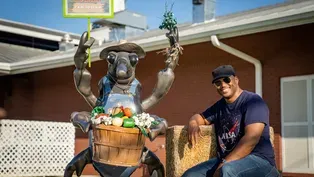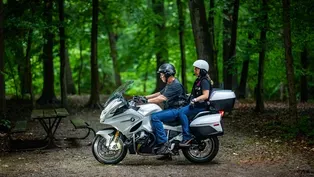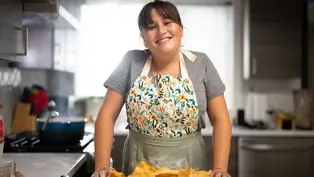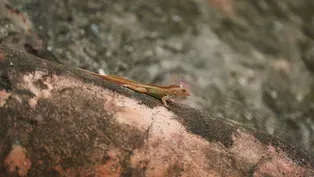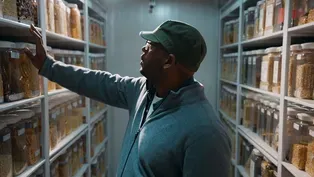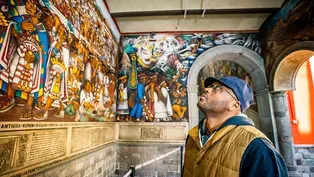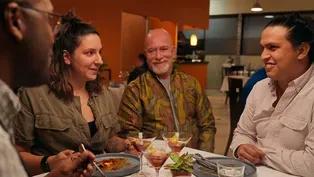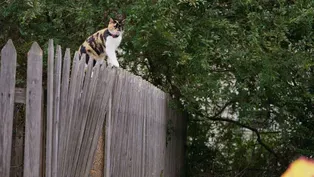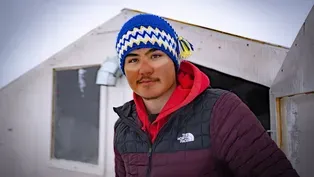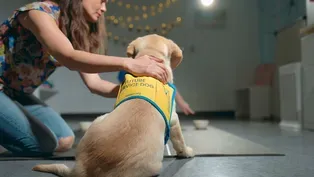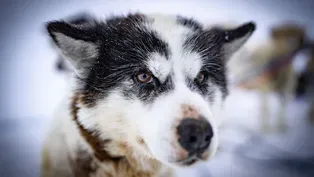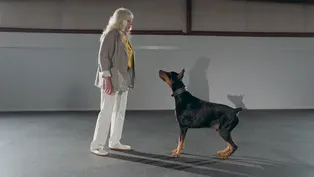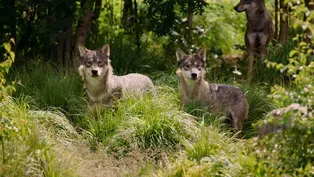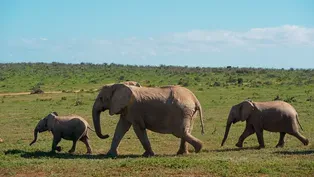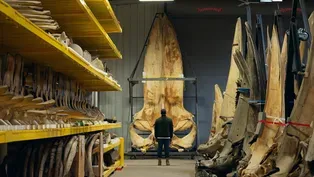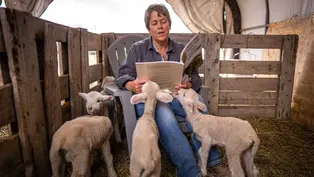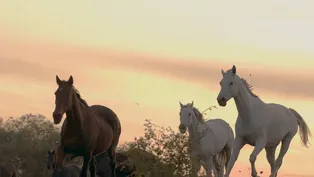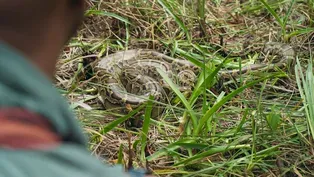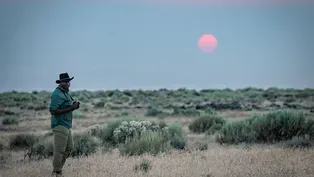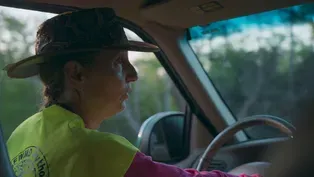
What Is 'Human Footprint'?
Clip: Season 1 | 9m 29sVideo has Closed Captions
"Human Footprint" is a deep dive into a world reshaped by one remarkable species: us.
"Human Footprint" is unlike any other science, natural history, or travel series out there, because it’s all of those things and then some. It’s a journey guided by biologist Shane Campbell-Staton, scored by hip-hop legend Adrian Younge, and made endlessly entertaining by a dazzling array of characters. At its core, "Human Footprint" asks: what do the things we do tell us about who we are?
Problems with Closed Captions? Closed Captioning Feedback
Problems with Closed Captions? Closed Captioning Feedback

What Is 'Human Footprint'?
Clip: Season 1 | 9m 29sVideo has Closed Captions
"Human Footprint" is unlike any other science, natural history, or travel series out there, because it’s all of those things and then some. It’s a journey guided by biologist Shane Campbell-Staton, scored by hip-hop legend Adrian Younge, and made endlessly entertaining by a dazzling array of characters. At its core, "Human Footprint" asks: what do the things we do tell us about who we are?
Problems with Closed Captions? Closed Captioning Feedback
How to Watch Human Footprint
Human Footprint is available to stream on pbs.org and the free PBS App, available on iPhone, Apple TV, Android TV, Android smartphones, Amazon Fire TV, Amazon Fire Tablet, Roku, Samsung Smart TV, and Vizio.
Buy Now

Surprising Moments from Human Footprint
Do you think you know what it means to be human? In Human Footprint, Biologist Shane Campbell-Staton asks us all to think again. As he discovers, the story of our impact on the world around us is more complicated — and much more surprising — than you might realize.Providing Support for PBS.org
Learn Moreabout PBS online sponsorship- [Narrator] Welcome to the age of humans.
(lively music) - Hell to the yeah, this is crazy.
- My name is Shane Campbell-Staton and I am lucky enough to be the host of Human Footprint.
Wow, this is ridiculous.
Ha ha.
Good shot.
Hell of a good time.
I would say "Human Footprint" is a journey.
I think it's definitely my journey, but I think it's more of a collective journey to explore exactly who we are as a species.
- "Human Footprint" is a science series, and a travel series, and a natural history series, kind of, all wrapped into one.
It's a show about the things that humans do to the planet and have done to the planet.
And in investigating our footprint on the planet, we also learn about ourselves.
- That is not for the faint of heart.
- I think it's an important story to tell right now.
It's easy to get sucked into our day-to-day routines and not think about how absolutely bizarre it is that we live on a planet with 8 billion people and that most of the biomass on the planet is stuff that we eat and that we've got technology that we've never couldn't even imagine 50 years ago.
And we're just now coming to a time where scientists are understanding the impacts that we're having.
I think it's important that we're asking ourselves those questions, so I hope audiences walk away feeling like they're challenged to think about it a little bit more.
- What do you do for a living?
- I am a professor at Princeton.
- Oh, really?
- Yeah.
- How they trick into doing this?
- We met Shane while filming "Laws of the Lizard" for Smithsonian Channel, and he was one of the scientists that we featured in that show.
- I came to a point in my career where a lot of my research was focused on human impacts and how it impacted evolution and I realized something that I had never really seen on television before.
- It was incredibly fortuitous because Nate and I had actually been developing and pitching a non-hosted series about evolution in the age of humans.
And from across the room I saw his beautiful brown eyes and I thought to myself, I have to put this man on television.
This man deserves to be on television.
- And I think Shane coming to us and proposing himself as host, which is like a ballsy move but totally justified because he's got the goods.
Gave that pitch, sort of, the secret sauce, I think, to put it over the edge.
- We came together and I think it ended up being something different than either of our ideas but better than either of those ideas and something completely unique.
- And three years later, we were on our first shoot making this show.
And I still like his eyes.
- When Nate and Neil approached me about working on this series, I was like, "Really?
We get to be able to do this?
We're gonna be able to tell these kind of stories?"
A lot of environmental stories are created in a way that are, they're simplified where you you lose a lot of the nuance.
And so with this series we had an opportunity to dive into some of these subjects that are kind of messy.
There's no right answer and the answers that you do find are sometimes a little unsettling.
The opportunity to work on a project like this was something that I just couldn't pass up.
- From a very early stage of development, the show that most inspired us was Anthony Bourdain's "Parts Unknown".
Bourdain wasn't like a person who told you how to feel, he was a person who got the information out there, assumed you were a smart, intelligent person, emotionally sensitive individual and let you put it all together.
And we really tried to do that in this show.
- "Human Footprint" would not be "Human Footprint" without Shane.
- Cheers.
- Cheers.
- Shane Campbell-Staton is a singular phenomenon, as a scientist and science communicator.
His science is amazing and rigorous and widely respected by his peers.
He's also a dynamic and charismatic personality on screen.
- Once Gators are on the menu, - Yeah.
like you've reached official gangster status.
This is absolutely incredible.
- [Neil] He thinks big.
He has big ideas and big ambitions and the skills to execute on those ambitions.
- I had to give a lot more of myself than I anticipated.
You know, it's one thing for me, like, as a scientist to sit up and give a lecture, like these are the things I know and so on and so forth.
But at some point you actually, you have to give more of yourself than just what you know.
That's not something I typically do.
I've spoken with, like, family and friends, like, several times about some of these trips and some of the conversations and they're like, "I'm sorry, you talked about what in front of a television?"
"You did what?"
I've had conversations on camera that I haven't even had with my mom.
- Shane shares his perspective but I think we leave a lot of room for everybody to come away with their own take-home message from some of these episodes.
And I think that's important because we're all co-creators of whatever future we create for ourselves.
Understanding how we got to the present is a prerequisite for charting a path forward into a future that we want.
♪ I was the black cat that used to have bad luck ♪ - You know, Shane is a nineties hip hop fanatic.
And so we were like, well, what if we made a real different kind of show?
And I think once we started, like, thinking about the show as a way to showcase Shane's personality and his background, I think all of us were like, oh my God, this is like, this is gonna be a good show.
- Yeah, it's smooth, it's beautiful.
It's, you know, it's got flavor, you know?
And I think it's something that you don't really see in this genre very often.
- I think science documentaries in general are made for older male skewing, generally, whiter audiences than the American public at large.
And I hope that this series appeals to a broader audience than that, a younger audience, a more diverse audience.
I think, we would like for everybody to realize that their lives are connected to science and that the choices they make have impacts on the world around them and their fellow humans.
- You know, I think the one thing that I was really hoping to accomplish with this series is, for it to be something that no one has ever seen before.
And I really think that we've been able to do that.
I've never seen anything like it.
It's incredible.
The style, the flavor of the conversations, the music, just everything about this show is just, it's dynamic.
I think it's just a dynamic dope show.
I love it.
(chuckling) - The battle started and we've never stopped doing it.
- What you realize when you try to come into these stories with an open mind is that humanity is not bad.
We're all doing our best, right?
People are trying to live good lives, and trying to provide for their families, and trying to be productive, and create things that are of value, but we don't always think very far ahead when we do these things.
- Step by step, we get to a world that looks pretty bizarre.
- [Shane] We have a kind of power that is singular but we spent a lot of our history wielding that power like a child with a chainsaw, you know?
Just, kind of, going at it and not really thinking about the consequences.
- We can transform the planet at an incredible scale and speed without even really understanding what we're doing.
And I think it doesn't take individual humans being bad humans to do that.
- [Shane] But that story isn't done yet and we are still learning.
- It's the result of all these choices that we've made.
We evolved on this planet.
We were shaped by our environment, and we are this unique species that has the power to transform everything.
But as soon as we change the world it turns back around and it changes us.
That's, I think, the biggest take-home message is that we are not separate from nature.
We are of this earth.
- Do we have the ability to change?
Absolutely.
The question is, will we?
(ominous music)
Video has Closed Captions
"Human Footprint" is a deep dive into a world reshaped by one remarkable species: us. (9m 29s)
Video has Closed Captions
Explore the global impact of Earth’s most ingenious, destructive, and adaptable species. (30s)
Video has Closed Captions
Shane Campbell-Staton explores how humans have impacted the planet in this first look. (1m 30s)
The Making of Episode 1: Strangers in Paradise
Video has Closed Captions
An inside look at "invasive" species that make Shane reconsider what it means to belong. (4m 49s)
Making 'Human Footprint': The Grind
Video has Closed Captions
Find out how making "Human Footprint" challenged our minds and broke our bodies. (6m 51s)
The 'Human Footprint' Soundtrack
Video has Closed Captions
There’s nothing quite like Human Footprint, and Adrian Younge’s score is a big reason why. (4m 57s)
Why the Boll Weevil is this Alabama Town's Mascot
Video has Closed Captions
Shane learns how the boll weevil became an icon in Enterprise, Alabama. (2m 36s)
Meet the 'Puff Daddy' of Cotton
Video has Closed Captions
Shane visits Julius Tillery's cotton farm to learn about the legacy behind the brand. (2m 28s)
How Geology Influenced Cotton Production
Video has Closed Captions
Shane explores the remarkable journey that transformed the ancient Cretaceous seas. (3m 1s)
Video has Closed Captions
Shane explores the Human Footprint of cotton, from ancient rocks to 21st-century politics. (30s)
Reimagining Green City Living in Singapore
Video has Closed Captions
In Singapore, nature is the blueprint. Green spaces aren't just an afterthought. (3m 25s)
Hunting Urban Rats with a Pack of Dogs
Video has Closed Captions
Discover how Scott and Angie Mullaney use their loyal canines take on the urban rat race. (2m 40s)
Video has Closed Captions
Shane explores three thriving urban species and envisions a wilder future for our cities. (30s)
City vs. Forest Anole Adaptations of Puerto Rico
Video has Closed Captions
Meet Kristin Winchell, the urban evolution guru who's unraveling the secrets of anoles. (2m 52s)
The Top Secret Vault for Ancient Maize
Video has Closed Captions
Shane dives into Mexico's cornucopia with geneticist Sarah Hearne. (1m 30s)
Video has Closed Captions
Shane meets five species that made allies of humans. (30s)
Video has Closed Captions
Shane meets with local Mexican chefs committed to reviving the sacred heritage of maize. (1m 30s)
The Cat Tracking Device of the Future
Video has Closed Captions
Dr. Roland Kays uses a global GPS tracker plan to unleash the secret lives of wild cats. (3m 25s)
Shane Meets an Inuit Sled Dog Hunter
Video has Closed Captions
Chilling in the Arctic: Shane explores the role of how sled dogs in Resolute Bay. (2m 52s)
Puppy IQ: How Canine Smarts Evolved with Humans
Video has Closed Captions
Vanessa Woods studies the wonders of canine cognition at Duke Puppy Kindergarten. (2m 16s)
Video has Closed Captions
Shane’s love of dogs turns to awe as he discovers their profound impacts on humans. (30s)
A Day at a Canine Freestyle Dance Class
Video has Closed Captions
Shane joins a “canine freestyle” dance class. (2m 22s)
The Wolves Among Us in Yellowstone
Video has Closed Captions
As Top Predator, we eliminate competition, like America's wolves. (2m 5s)
Searching for the Tuskless Elephants of Gorongosa
Video has Closed Captions
Shane's research reveals how our actions can change the course of evolution. (4m 50s)
Exploring the Epic Whale Warehouse with Shane
Video has Closed Captions
Shane meets Nick Pyenson, a biologist studying ancient and living whales. (2m 59s)
Video has Closed Captions
From Yellowstone to Mozambique, discover the impact of the planet’s Top Predator: us. (30s)
The Wild Horses of Nevada's Deserts
Video has Closed Captions
Shane ventures into the vast deserts of Nevada to learn about wild horses on public lands. (3m 4s)
Tracking a Burmese Python with Biologists in Florida
Video has Closed Captions
Biologists work tirelessly to radio track Burmese Pythons deep in Florida's marshland. (4m 5s)
Video has Closed Captions
Shane tracks down four invasive species that make him reconsider what it means to belong. (30s)
Cruising the Everglades with a Burmese Python Hunter
Video has Closed Captions
Shane’s journey begins in Florida, where he joins Donna Kalil on a Burmese python hunt. (2m 46s)
Providing Support for PBS.org
Learn Moreabout PBS online sponsorship